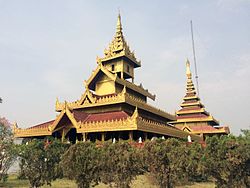Shwebo Palace
| Shwebon Yadana Mingala Palace | |
|---|---|
ရွှေဘုံရတနာ မင်္ဂလာနန်းတော် | |
 A reconstructed section of Shwebo Palace | |
 | |
| General information | |
| Status | Reconstructed; historical site |
| Architectural style | Traditional Burmese palace architecture |
| Location | Shwebo, Sagaing Region, Myanmar |
| Coordinates | 22°33′57″N 95°41′38″E / 22.5658°N 95.6938°E |
| Completed | Original: 1754 (main palace) Reconstructed: 1999 |
| Owner | Government of Myanmar |
| Known for | Capital of the Konbaung Dynasty (1752-1760); birthplace of King Alaungpaya |
Shwebon Yadana Mingala Palace (Burmese: ရွှေဘုံရတနာ မင်္ဂလာနန်းတော်) is a royal palace in Shwebo, Myanmar. The palace was originally built in 1753 AD by King Alaungphaya U Aung Zeya, who was the founder of the Konbaung dynasty[1] and was capital city until 1760 when the capital was moved to nearby Sagain. Different to other Royal palaces in Myanmar it was centered on a large, graduated pavilion.[2] Having two walls, the outer wall forms a 3.5-kilometre (2.2 mi) square closure, surrounded by a moat. With the tomb of King Alaungpaya located to the southeast of the palace building.[3] It was reconstructed in 1999[4] based on a mid 19th-century manuscript on a November 1853 expedition to collect the remaining timber posts of the palace, carve them out, and turn them into sacred images.[2] It has 200-metre (660 ft) long city walls.
The palace is home to the Shwebonyadana Palace Museum, built in 1994 and opened in 1999.[5] The museum replaced an earlier museum that was first established in 1904.[5]
References
[edit]- ^ "Untitled Document". Archived from the original on 2018-02-22. Retrieved 2018-02-12.
- ^ a b Tainturier, François (2014). "Of Golden Palaces and Celebrated Rulers: Inventing Traditions in Pre-colonial and Contemporary Myanmar". Journal of Burma Studies. 18 (2): 223–258. doi:10.1353/jbs.2014.0015. ISSN 2010-314X.
- ^ Yamada, Koji (2021). "A Research on the Applicability of the Mandalay Model to Other Historical Capital Cities of the Burmese Kingdom". Journal of JSCE. 9 (1): 184–197. doi:10.2208/journalofjsce.9.1_184.
- ^ "Ministry of Culture". Archived from the original on 2012-08-03. Retrieved 2012-02-19.
- ^ a b Zan, Nu Mra (2016). Sonoda, Naoko (ed.). "Museums in Myanmar: Brief History and Actual Perspectives". New Horizons for Asian Museums and Museology. Singapore: Springer: 19–36. doi:10.1007/978-981-10-0886-3_2. ISBN 978-981-10-0886-3.
